Hermitage: Strange Case Files Review – Lost in translation
Hermitage: Strange Case Files Review
Hermitage: Strange Case Files is an investigative visual novel from China that tackles paranormal mysteries wrapped in Taoist philosophy and other Chinese folklore. It’s more of a narrative conversational format like Coffee Time and VA-11 Hall-A rather than a courtroom format like Great Ace Attorney Chronicles and Danganronpa, yet it intersects both styles with its case-like investigation where clues could be discerned from conversations and research.
In Hermitage: Strange Case Files, you take the role of the Store Manager of the titular Hermitage bookstore that deals in rare and obscure tomes. A chance encounter with a bullied exchange student opens a pathway into some strange cases involving forbidden knowledge and eldritch horrors. As he cannot leave his post, he seeks the help of his confidants – elusive hackers, detectives, and legal consultants to aid him with his curiosities and aid helpless victims from succumbing to these unknown dangers.
Visual novels can be a hard sell for many gamers looking for a little more action, but in the hands of the right developer, can become narrative masterpieces in their own right. While a lot of reading is a given, cosmic horror is a heady topic that is rarely visual but highly conceptual and works well in the written form.
Lost In Translation
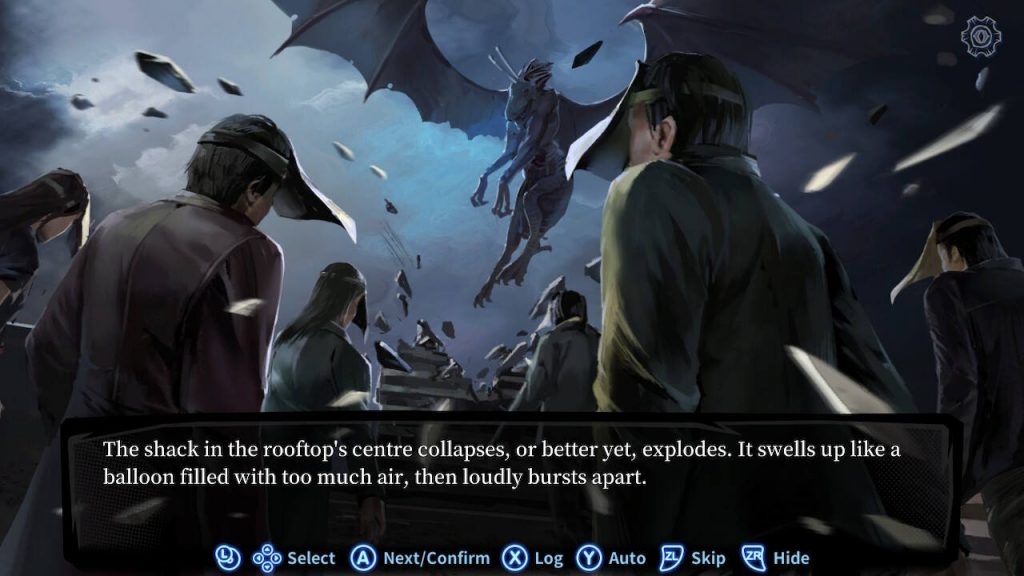
I was actually excited about Hermitage: Strange Case Files, so imagine my disbelief when it made quite a terrible impression on me going through its cringe-worthy first chapter. Instead of setting up the mood or getting me invested with the characters or the world, it starts off with a philosophical rant that borders on pretentiousness. We’re bombarded with insubstantial text that doesn’t spin a story, but strings together five-dollar words to show how educated and intelligent the text sound that is both off-putting and heavy-handed.
There is so much ostentatiously empty and needlessly expository text that bombards us. That is when I realized that this is maybe a cultural thing that has been lost in translation. Hermitage: Strange Case Files has strange choices for words used that it has become a bit of a distraction. While the translation is competent, the actual localization involving cultural nuance needed more work. Narrative-wise, after getting used to the stilted nature of its wordplay, I could actually follow the story.
The copy of the text is hastily edited and are filled with typos and a confused style guide that switches between UK and US spelling. It is quite frequent and distracting, which sadly has the quality of an unofficial fan-translated work. For a game where your interaction is 90% through the text, shoddy translation work is inexcusable.
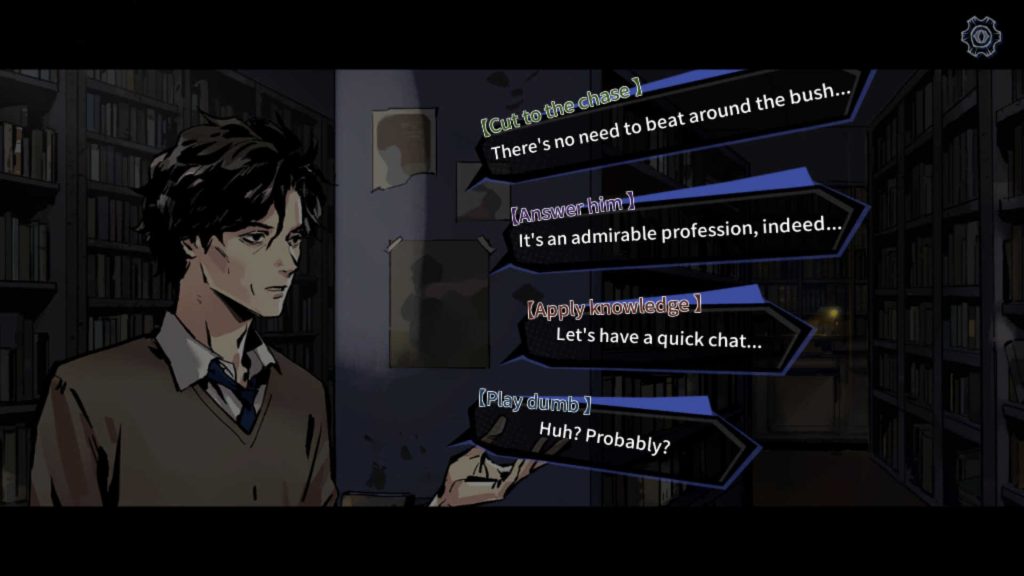
What’s worse is that after settling into this lop-sided translation is how uniform the dialogue sounds. A character would start a discussion in their voice – usually the Store Manager – and the person joining in the conversation will usually use the same words, rhythm, and style as that character that started the conversation. What results is that everybody now sounds alike and there is no voice acting to differentiate between the two.
To make matters worse, Hermitage: Strange Case Files has sudden style changes especially when a high school student starts the conversation. Outdated slang is used and then suddenly the Store Manager or someone older will respond in the same style as said student. What results is somewhere between unbearably awkward to downright embarrassing. Attempts at humor don’t land because of lost nuances and the awkward delivery itself is unintentionally funny.
The good news is if you’re able to withstand this type of delivery, the actual procedural aspects of the story in Hermitage: Strange Case Files are serviceable. As I mentioned above, you could definitely follow the story, you just have to get used to how they’re telling the story. For somebody not sensitive to such idiosyncrasies, it won’t be a problem, but it was a frustrating experience.
Read or Die
Hermitage: Strange Case Files follows a simple narrative loop following the course of the day the same way in games like Persona or Coffee Time. You spend the day inside the bookstore as The Store Manager or in the field with your confidants – Neko, Scarlet, and Justin. Each case lasts about a week and throughout the course of the case, you collect clues that help you answer Suspicions. Successfully solving these Suspicions allows you to more or less solve the mystery and get a good result to keep your characters alive or add to the mythos you’re slowly building.
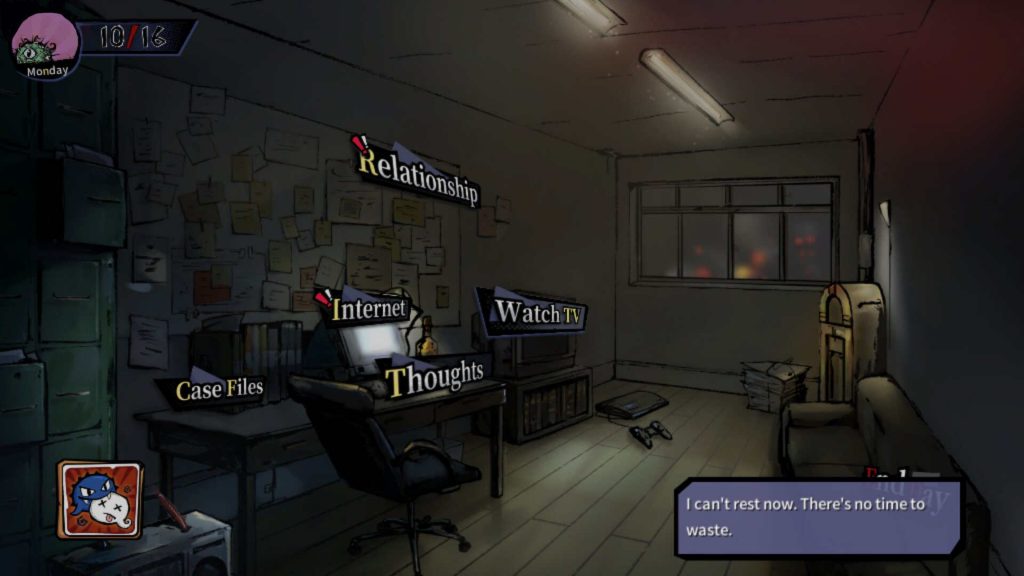
To collect clues, you gain them through Conversations, your collection of Strange Books, or through fieldwork. Since you work as a sort of improvised detective agency, each character can receive clues and then pool them together where the Store Manager will deduce a solution from the collected clues. The deductive modes are actually relatively easy and you can reload a save if you’re stuck.
What annoys me is how certain “features” of Hermitage: Strange Case Files actually add more clutter and are unnecessary to the overall loop, like an Observation mini-game that doesn’t collect any additional clues. I’ve encountered several of these already and have utilized it during specific times or selected each one and nothing is really added. The Internet feature during your nighttime research serves as a glorified codex that doesn’t really add much to the experience besides more reading.
Later on down the path you make certain dialogue decisions or story-based decisions that determine the trajectory of the story. More or less, the decisions end up being mostly binary – character lives or dies, case is solved or bad guy gets away. The usual stuff, as long as you’ve completed the Suspicions without making an error. It’s downright linear and there’s not much variety except for some strange “building exploration” mini-game on certain cases. You’ve seen one case in Hermitage: Strange Case Files, you’ve pretty much seen them all.
Something Borrowed
Hermitage: Strange Case Files wears all of its inspirations on its sleeve in a heavy-handed manner. The typeface is very much Persona inspired and the same goes for its Shoji Meguro jazzy background music that plays through the game like elevator music.
Much of the horror lore in the game is unabashedly Lovecraftian, and it references much of its source material like a badge of pride. Case Two and Three are Chinese facsimiles of The Dunwich Horror and The Shadow Over Innsmouth but referencing the Cultural Revolution and missing fishing villages to the South of China.
The artwork in Hermitage: Strange Case Files is largely static and works quite to its detriment. With limited drawings and a lack of voice over, it really doesn’t add to the uniform sounding dialogue. Hermitage: Strange Case Files could’ve benefited from a variety of drawings as there is no voice-over to really guide us. What exacerbates it is the lazy copy editing of the text that throws off the story into a tailspin, especially when perspective changes are used.
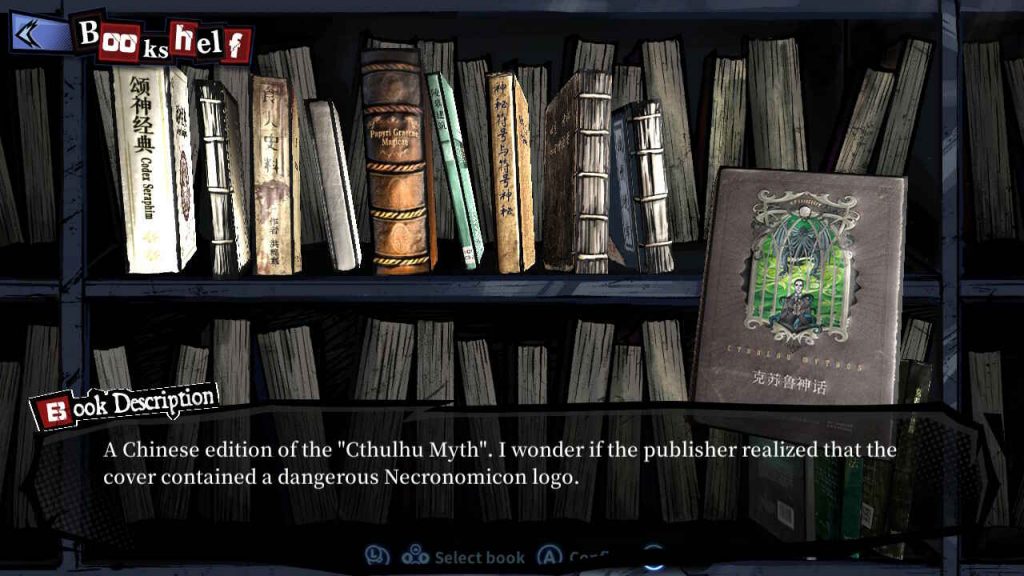
Not every scene involves the Store Manager, but when he is on screen, the text follows the first-person narrative in his narrative voice. When the story shifts to the perspective of another character, the same narrative voice is used, which is confusing because we’re led to believe that the Store Manager is somewhat omniscient. While it was forgivable during the first few chapters, this inconsistent structure feels like lazy formatting.
In the end, with the inconsistent style guide and sloppy copy editing, the story of Hermitage: Strange Case Files ends up reading like bad fan fiction, which is a shame because there are some moments where the written work delves into a more original direction into the Cthulhu Mythos, following a more Asian perspective missing from the traditional Western perspective on the subject.
Where Hermitage: Strange Case Files shines is when it applies the familiar cosmic horror literature into a fresh spin namely in the way Taoist philosophy is used. I was surprised when they referenced a horror coming from the end of time incorporating the Taoist philosophy of nothingness to create a sense of existential dread. It was a creative way of re-purposing Lovecraftian horror from a Chinese perspective and I appreciated that originality.
I really wished Hermitage: Strange Case Files would’ve done a better job combining these borrowed tropes with Chinese culture and mythology and turn it into something cool. Because when they do, the game really shines, but it misses the mark many times into the play through and leans heavily into cringy dialogue and overwritten descriptions.
What We Liked:
- Interesting premise, combining Taoist philosophy with cosmic horror.
- Some cases could’ve worked as an entertaining anime episode.
- Decent Shoji Meguro inspired jazzy soundtrack.
What We Didn’t Like:
- The copy editing is sloppy and the translation reads fan-made.
- Uniform dialogue and lack of varied animation make characters look and sound static.
- As a visual novel, it follows a rigid linear path with little variation in the gameplay.
- Meaningless game mechanics that just adds more reading to the already bloated text.
Verdict: Ignore It

Hermitage: Strange Case Files is a halfway decent light novel and a halfway decent manga. Sadly, it doesn’t actualize itself into becoming a fully formed visual novel, mainly due to a sloppy localization with lazy copy editing and an inconsistent style guide. The game could’ve benefited from more art or voice work that could’ve at least given us more interactivity as the title ends up becoming a half-baked mess.
If translated properly, the plot of Hermitage: Strange Case Files could’ve been saved as a light novel or a manga as it tackles some creative elements of the Cthulhu mythos from an Asian perspective. There are some really creepy vibes and heady concepts that involve existential dread, but this format squanders it by delivering something lazy and sloppy that feels like reading terrible fanfiction.
As a visual novel, Hermitage: Strange Case Files doesn’t add anything new to the medium and furthermore fails to capitalize on the format. There is a linear narrative and while there are possibly other branching narratives, the choices mostly feel arbitrary giving you little to play with and the overall story could’ve been better told on another visual medium.
*Hermitage: Strange Case Files was reviewed on the Nintendo Switch with a review code provided by the publisher.




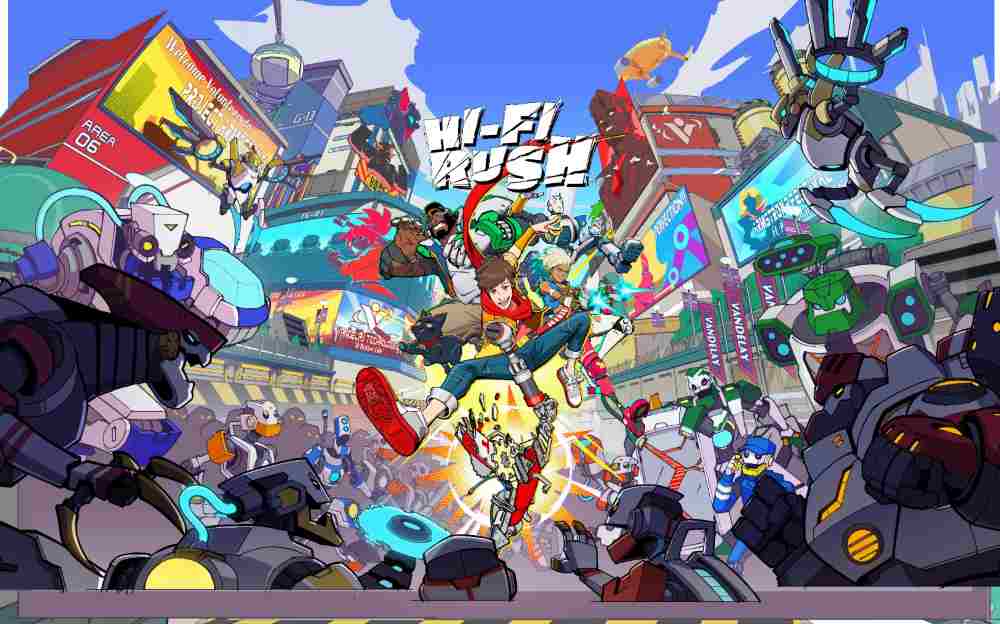
2 Comments
Dekk
I respectfully disagree. I’m a long time visual novel fan, and while the translation issues are present, once you’re used to them they really don’t get in the way. It honestly reminds me a lot of reading any sort of translated book – sometimes there’s going to be a bit of clunkiness, but there’s never a point where you’re totally lost as to what’s being said. The biggest issue with the translation is sometimes with the “suspicion” mechanic, but at worst those just requires a few reloads or a glance at a walkthrough to solve.
I’m at the last chapter of this one now, and have honestly found it a really entertaining VN to read. I honestly really like how it wears its influences on its sleeve (the chimera in Chapter 4 is a great example). The trick is to just not take it too seriously; this isn’t the kind of cosmic horror that always ends with everybody broken down and insane, but is a step closer to something like a cozy Dresden Files – you get to know the investigation team and appreciate their interactions, there’s an interesting bigger narrative lurking between all these smaller cases, and it really captures the vibe of a paranormal world lurking just outside of normal view (with a handful of investigators keeping one foot in it). I also appreciated the fact that they fully embrace the Chinese setting in the narrative. Overall, I have grown to really enjoy the setting and the characters.
Great visual novels are few and far between, but even a good one is worth playing in my opinion, and this is definitely one of them. Hermitage might not be of the legendary visual novel caliber of something like Remember11, Raging Loop, or The House in Fata Morgana, but to me it’s still absolutely worth playing, especially for fans of supernatural narratives.
Vincent Ternida
True enough, I see what you’re saying, but it’s hard to excuse the terrible localization especially for the price you’re paying for the game, so it is difficult not to take it seriously especially when the writing reads amateurish because of the sloppy translation.
Regarding the story, I can see the appeal for veteran visual novel aficionados, however it’s not going to create new fans or even push dabblers to ask for more. As you mentioned there are better titles out there. With so much selections to peruse, I didn’t see it fit to recommend something that will not be for everyone’s taste.